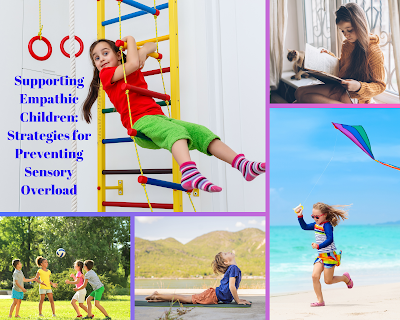Raising Empaths: Recharging After Sensory Overload.
Introverts and extroverts see and interact with the world differently. When raising empathic, introverted, or hyper-sensitive children it's important to be attuned to your child's needs and energetic boundaries.
Remember even extroverted children can become overwhelmed and feel overstimulated too. Some children are more sensitive than others. Adjust your parenting techniques and skills accordingly to your child.
As parents, we strive to understand and support our children's unique traits and needs. One such trait that may require special attention is empathy. Empathic children have an incredible ability to sense and absorb the emotions and energies of those around them. While this sensitivity can be a gift, it can also lead to sensory overload and emotional exhaustion. In this article, we will explore strategies for recharging empathic children after sensory overload, allowing them the space and freedom they need to thrive.
Give your empathic child space to decompress and play alone.
Empathic children often feel overwhelmed by the constant barrage of emotions and energies they encounter throughout the day. To help them recharge, it is crucial to provide them with a safe space to decompress and be alone. This can be as simple as creating a cozy corner in their room with soft blankets and pillows, where they can retreat when they need a break.
In this quiet space, they can engage in activities that help them relax and recharge. Some children might enjoy reading a book, drawing, or listening to soothing music.
Others might prefer activities that allow them to release pent-up emotions kinetically (through movement), such as playing alone with their toys, practicing yoga, or dancing to music.
By giving them this dedicated time and space to unwind, we allow them to process their emotions and restore their energy.
Some adults and children require more than others. If you are an introvert, empath, or highly sensitive person you understand their need for downtime or space to recharge.
It is important to note that this time alone is not meant to isolate them but rather to provide a respite from the constant sensory input they experience. By having this space, they can learn to set boundaries and listen to their own needs, ultimately fostering a stronger sense of self-awareness and emotional regulation. (A practice of self-care)
Don't overbook your child.
In our fast-paced society, it is easy to get caught up in the hustle and bustle of extracurricular activities, playdates, and commitments for our children. However, for empathic children, overbooking can quickly lead to sensory overload and emotional exhaustion.
While it is essential to expose our children to new activities, it is equally important to follow their lead and respect their boundaries. If your child hesitates or resists joining multiple activities, it is crucial to honor their feelings. Pressuring them to participate in activities they are not interested in can be overwhelming and counterproductive.
Instead, encourage exploration of new activities on their own terms. Provide them with a variety of options, and let them choose what resonates with them the most. By allowing them the freedom to pursue activities that genuinely bring them joy, we empower them to take ownership of their own well-being and recharge at their own pace.
Try new activities or sports but follow your child's lead.
While it is essential to respect your child's boundaries, it can also be beneficial to gently encourage them to step out of their comfort zone and try new activities or sports. However, it is crucial to do so in a way that respects their unique needs and preferences.
Start by having an open and honest conversation with your child about their interests and fears. Listen attentively to their concerns and offer reassurance and support. Together, brainstorm new activities or sports that align with their passions and comfort levels.
When introducing these new activities, be mindful of the sensory input they may entail. For example, if your child is sensitive to loud noises, consider enrolling them in a quieter sport such as swimming or climbing. If they are easily overwhelmed by crowded spaces, opt for smaller group activities or one-on-one lessons.
Remember, the goal is to gently encourage them to explore new experiences. By following their lead and respecting their boundaries, you create a supportive environment that allows them to recharge and grow.
Empathic children possess a remarkable ability to connect with others on a deep emotional level. However, this sensitivity can also make them prone to sensory overload and emotional exhaustion. By giving them space to decompress, avoiding overbooking, and encouraging them to try new activities at their own pace, we can help them recharge and thrive.
As parents, it is our role to support and nurture our children's unique traits. By understanding and adapting to their needs, we empower them to embrace their empathic nature and navigate the world with compassion and resilience.
Thank you for joining us and supporting the inner light of the children,
Carol and Stacy
*** Take a look at all the resources we've put together to help you along your conscious parenting/living path.
*** Sign up for our newsletter and receive all four gifts absolutely free.
🦋Our first gift: 9 Children's Printable Affirmation Cards
🦋Our second gift: Guiding Your Parenting With The Four Clairs.
🦋Our third gift: Take Back Control - Managing Cell Phone Addiction
🦋Our fourth gift: Family Time Guide
*** Looking for more one on one support? Sign up for Voxer coaching.

No comments:
Post a Comment